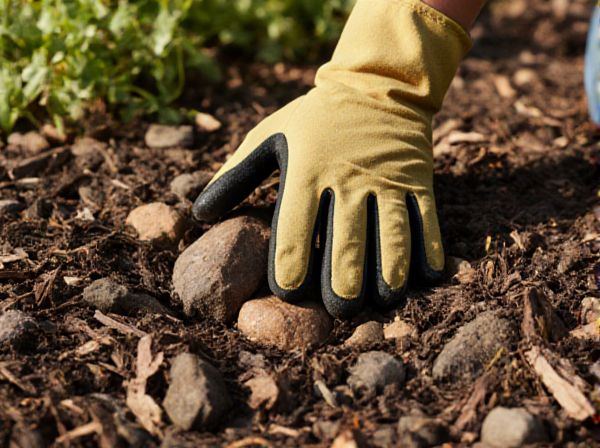
Rock mulch vs gravel mulch Illustration
Rock mulch and gravel mulch both serve as durable ground covers that help retain soil moisture and reduce weed growth. Rock mulch consists of larger, irregularly shaped stones that provide excellent erosion control and a natural aesthetic, while gravel mulch features smaller, smoother stones that offer better drainage and a more uniform appearance. Choosing between rock and gravel mulch depends on specific landscaping needs, including soil type, plant sensitivity, and desired visual impact.
Table of Comparison
| Feature | Rock Mulch | Gravel Mulch |
|---|---|---|
| Material | Natural stones, larger and irregular shapes | Small, rounded stones, typically 1/4" to 3/4" |
| Appearance | Chunky, rugged look | Smooth, uniform texture |
| Drainage | Good, but can retain some moisture | Excellent, allows quick water runoff |
| Weight | Heavy, stable under wind | Lighter, may shift more easily |
| Heat Retention | High, absorbs and holds heat | Moderate, less heat absorption |
| Weed Control | Effective, dense coverage | Good, but gaps may allow weed growth |
| Longevity | Long-lasting, minimal breakdown | Long-lasting, but may require replenishing |
| Cost | Higher initial cost | Generally more affordable |
| Maintenance | Low, rarely needs replacement | Medium, occasional raking and topping up |
| Best Use | Landscapes requiring strong visual impact and stability | Pathways, driveways, areas needing good drainage |
Introduction to Rock Mulch and Gravel Mulch
Rock mulch consists of larger, irregularly shaped stones that provide excellent soil protection and moisture retention, while gravel mulch features smaller, rounded stones ideal for decorative landscaping and improved drainage. Both types of mulch reduce weed growth and soil erosion, but rock mulch tends to be more durable and suited for long-term applications, whereas gravel mulch is often chosen for aesthetic appeal and ease of installation. Selecting the appropriate mulch depends on garden design, soil type, and desired maintenance level.
Definition and Types of Rock Mulch
Rock mulch consists of natural or manufactured stones used to cover soil surfaces, providing moisture retention and weed suppression. Common types include crushed granite, river rock, lava rock, and pea gravel, each varying in size, color, and texture to suit landscaping needs. Gravel mulch specifically refers to small, rounded stones often used for decorative pathways and drainage, differing from angular rock mulch that offers better soil stabilization.
What Is Gravel Mulch?
Gravel mulch consists of small, irregularly shaped stones that provide excellent drainage and prevent soil erosion while maintaining a natural aesthetic in landscaping. Unlike rock mulch, which often features larger, smoother stones primarily for decorative purposes, gravel mulch is favored for its ability to retain moisture and suppress weed growth effectively. Its porous texture also helps moderate soil temperature, promoting healthier plant growth in garden beds.
Key Differences: Rock Mulch vs Gravel Mulch
Rock mulch consists of larger, irregularly shaped stones that provide superior moisture retention and erosion control, while gravel mulch features smaller, rounded particles offering better drainage and a smoother aesthetic. Rock mulch tends to be heavier and more stable, reducing displacement by wind or water, whereas gravel mulch is easier to spread and ideal for pathways or decorative uses. Choosing between the two depends on garden needs like drainage, visual appeal, and maintenance requirements.
Benefits of Rock Mulch in the Garden
Rock mulch offers superior moisture retention and temperature regulation for garden soil compared to gravel mulch, promoting healthier plant growth. Its heavier weight prevents displacement by wind and heavy rain, maintaining consistent coverage and reducing soil erosion. Additionally, rock mulch provides a natural aesthetic appeal while suppressing weeds effectively without the need for chemical herbicides.
Advantages of Using Gravel Mulch
Gravel mulch offers superior drainage compared to rock mulch, preventing water accumulation and root rot in garden beds. Its smaller, uniform particles create a more stable surface that reduces weed growth and soil erosion effectively. Gravel mulch also retains heat efficiently, supporting plant growth by maintaining consistent soil temperatures.
Aesthetic Appeal: Rock vs Gravel Mulch
Rock mulch provides a more natural and rugged aesthetic, often featuring larger, irregularly shaped stones that create a visually striking contrast in landscaping. Gravel mulch consists of smaller, uniformly sized particles that offer a smoother, cleaner look, making it ideal for contemporary garden designs. Both options enhance curb appeal, but rock mulch emphasizes texture and dimension, while gravel mulch highlights uniformity and sleekness.
Maintenance Requirements for Each Mulch Type
Rock mulch requires minimal maintenance as it does not decompose, reducing the need for frequent replacement or replenishment. Gravel mulch, while also low-maintenance, may need occasional raking to maintain an even surface and prevent weed growth, especially in high-traffic areas. Both types require periodic inspection to remove debris and ensure proper weed barrier effectiveness, but rock mulch tends to be more durable over time.
Best Applications: When to Use Rock or Gravel Mulch
Rock mulch is ideal for areas requiring strong erosion control and heat retention, such as slopes and garden beds with drought-tolerant plants, while gravel mulch works best in pathways, driveways, and spaces needing better drainage and a smoother surface. Choose rock mulch for decorative landscaping that benefits from larger, more stable stones, and opt for gravel mulch in vegetable gardens or around trees where soil aeration and moisture control are critical. Both mulch types reduce weed growth, but selecting based on site conditions and plant needs ensures optimal garden health and aesthetic appeal.
Environmental Impact: Rock Mulch vs Gravel Mulch
Rock mulch, often composed of larger, irregular stones, can increase heat retention in soil, potentially affecting moisture evaporation rates and local microclimates. Gravel mulch, made of smaller, rounded stones, generally allows better water permeation and less heat absorption, promoting healthier soil hydration and reducing stress on surrounding plants. Both materials are durable and erosion-resistant, but gravel mulch tends to support better environmental sustainability by enhancing water conservation and soil health.
Rock mulch vs gravel mulch Infographic

 gardendif.com
gardendif.com